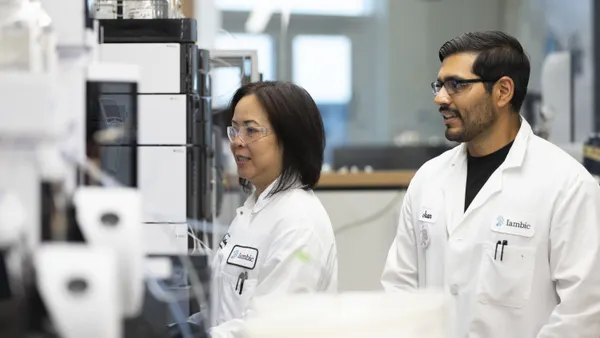Today, a brief rundown of news from Vir Biotechnology and Vertex Pharmaceuticals, as well as updates from Neurocrine Biosciences, Alnylam Pharmaceuticals and venBio that you may have missed.
Vir Biotechnology is cutting one-quarter of its workforce in a pivot away from infectious disease research. The company, which rose to prominence with its coronavirus antibody work in the pandemic, plans to phase out research in influenza, COVID-19 and its T cell-based viral vector platform. Instead, it will focus on hepatitis and three cancer drugs it is licensing from Sanofi. Vir now expects to end the year with some 435 employees, down by about 200 from a peak in the second quarter of 2023. — Ned Pagliarulo
Vertex Pharmaceuticals has stopped developing two drugs for the rare disease alpha-1 antitrypsin deficiency, citing biomarker data that indicated neither treatment would deliver “transformative efficacy.” The company plans to continue optimizing its treatment approach of using small molecule “correctors” to increase levels of the AAT protein that’s lacking in people with the disease. It previously shelved two other compounds for AAT deficiency. — Ned Pagliarulo
Shares of brain drug developer Neurocrine Biosciences rose more than 8% Thursday on an earnings report that impressed Wall Street. The company's flagship product, Ingrezza, did better than analysts expected, generating $580 million during the second quarter. Neurocrine now predicts net sales from Ingrezza to total between $2.25 billion and $2.3 billion this year. The company also provided updates on two research programs — one targeting schizophrenia, the other a genetic disease affecting the adrenal glands — that analysts viewed as positive. High-level results from a mid-stage study of the schizophrenia drug should come before the end of September. — Jacob Bell
Regeneron Pharmaceuticals decided against collaborating further with Alnylam Pharmaceuticals on an experimental drug the companies were testing for cerebral amyloid angiopathy and Alzheimer’s disease. Alnylam now has full global rights to the drug, called mivelsiran, in all indications, while Regeneron could still receive royalties if it’s approved and successfully sold. — Ned Pagliarulo
Venture capital firm venBio has raised $528 million for its fifth fund, which will continue to focus on supporting developers of biopharmaceutical medicines. venBio will use the fund to build companies, as well as to invest at “key inflection points,” such as crossover rounds and at initial public offerings. Recent investments by venBio include drugmakers Marea Therapeutics, Attovia Therapeutics and Alumis. — Ned Pagliarulo














